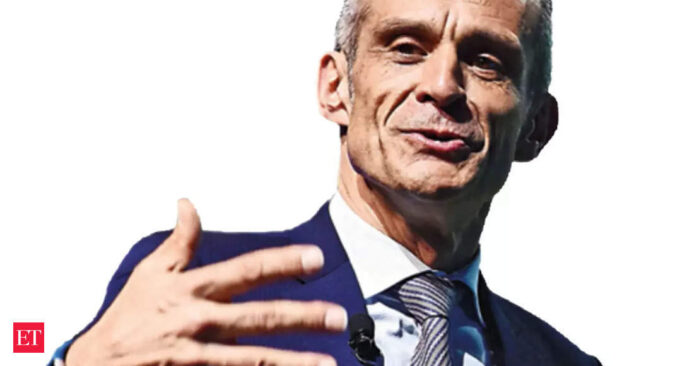The panel, consisting of the heads of global corporations, pegged India to be the skills hub of the world. They also said the South Asian nation stands to benefit from the diversifying of supply chains underway across the world.
“I’m super optimistic about India … there is no other place in the world where we have invested more than in India over the past 20 years. India is the epicentre of faster transformation, faster growth,” said Jean-Pascal Tricoire, chairman of Germany’s Schneider Electric that employs 35,000 people in India now.
“I see a lot of potential here because if you look at the future of energy, it’s about digitisation, IoT, smart buildings,” he said, adding: “Which other country is better tuned to digitise everything than India?”
Ben Driggs, chief executive of global high growth regions at Honeywell, pointed to the growth in India’s aviation sector, underlined by the recent order of around 500 aircraft by Air India.
“I think it’s really exciting to see the growth in aviation in India. Anytime a country goes for approximately 500 commercial aircraft, where most projections are a thousand in five years, that’s tremendous,” he said. “It’s a tremendous opportunity for passengers, for people. It’s an opportunity for business, obviously enabled by the infrastructure and other growth in the country.”Driggs said the same was true for the digitalisation and sustainability opportunities in India.India is expected to be the fastest growing of the seven largest emerging-market and developing economies though the pace is projected to slow to 6.9% in FY23 and 6.6% in FY24 from 8.7% in FY22, as per the World Bank. The global economy is projected to grow 1.7% in 2023 and 2.7% in 2024. Growth in advanced economies is forecast to slow to 0.5% in 2023, from 2.5% in 2022.
Hans-Paul Burkner, global chair emeritus at Boston Consulting Group, said India, along with other Southeast Asian nations, would benefit from the move of companies to diversify their supply chain.
“What is important is to make sure that you are hedging your risks and not trying to serve everybody from one source … we will see major shifts coming,” said Burkner.
“So, I think it’s a chance for India to become a major source. But it also requires India to be open and being confident, rather than trying to protect itself and trying to make sure that India’s position is not threatened, because it’s not a threat,” he added.
India is set to emerge as the skilling hub for the world, said Suneeta Reddy, managing director at the Apollo Hospitals Group.
“India has an opportunity now to provide medical healthcare personnel for the rest of the world. So, it’s not just about vaccines, but about creating a sustainable healthcare model, not just for India, but the world,” she said.
Other panellists included PricewaterhouseCoopers global chairman Bob Moritz and Jonathan Yap, CEO, Listed Funds, CapitaLand Investment. The discussion was moderated by Ajit Ranade, economist & vice chancellor of Gokhale Institute of Politics.
